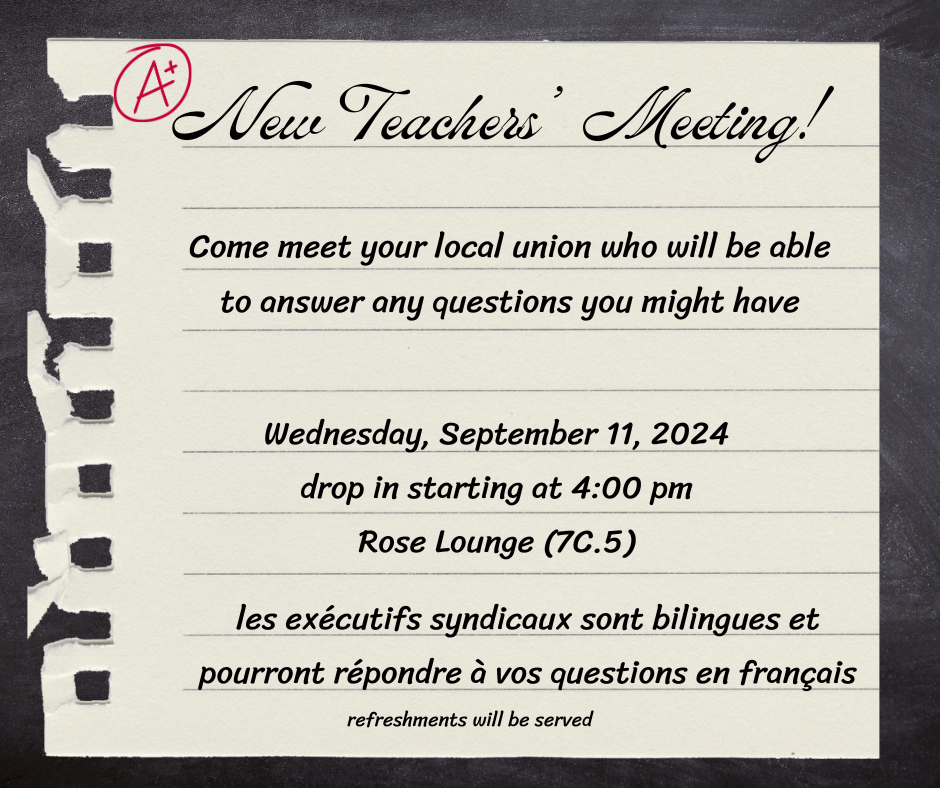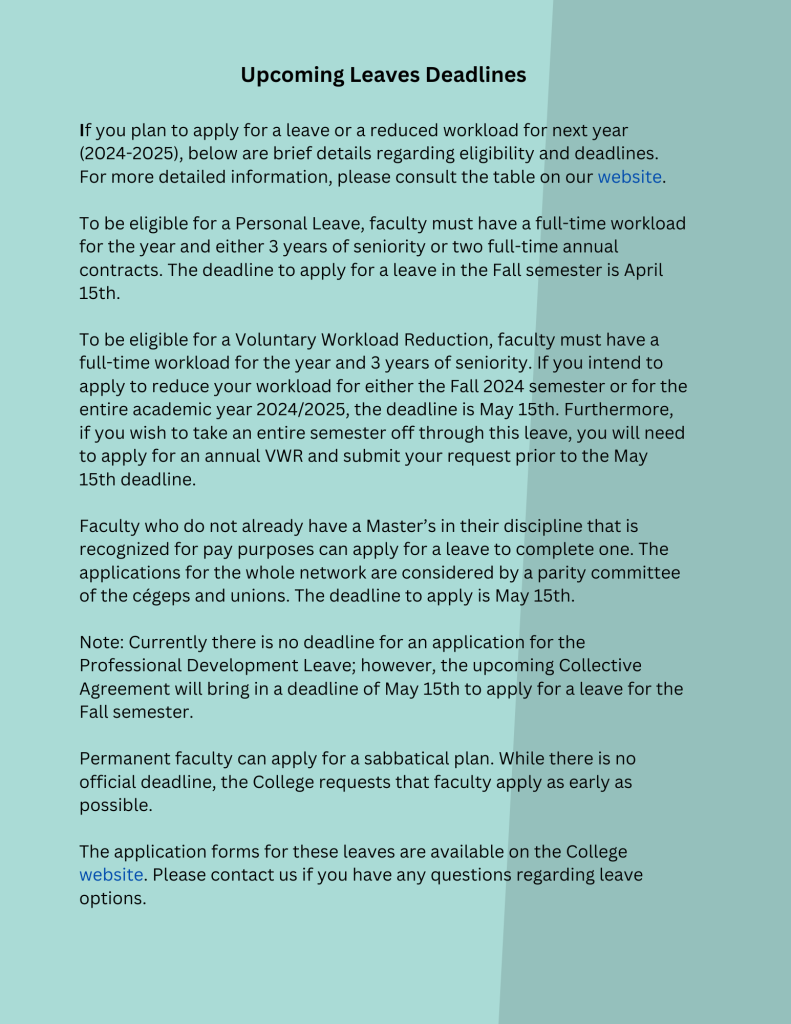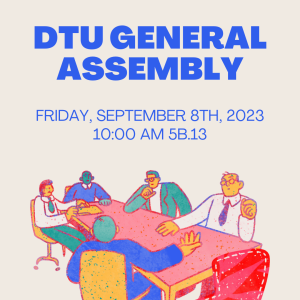Author: admin
Owl Hoots 573
Owl Hoots 572
Owl Hoots 570

IN THIS ISSUE
Law 14 Petition
Upcoming Events
27 Pays – Permanent Teachers
Salary Increases and Retro
French Language Training Release
Student Accommodations and Issues DTU By-ElectionsPARC Activities are now free!
Law 14 Petition
As announced at the DG’s Welcome Assembly, the DSU has launched a petition to exempt Indigenous Students from Law 14 which will be presented at the National Assembly by Jennifer Maccarone – MNA for Westmount-Saint Louis.
To learn more about the impact that Law 14 will have on Indigenous students, you can hear them speak about it in their own words in the following video produced by the anglophone Cegeps.
We encourage you to add your name to the hundreds who have already signed to show your support for our Indigenous students. You can sign the petition here anytime before September 30th.


27 Pays – Permanent Teachers
As a reminder, this year there are 27 pay periods; the College sent out a Memo about this on May 28th. As a result, permanent teachers received an “advance” pay for the period August August 4th to 17th; this “advance” is then spread out over the remaining 26 pays. This is represented on your pay statement as 62.5 hours per pay period. However, it is important to note that permanent teachers earn an annual salary; they are not paid hourly, and the hourly rate that shows up on the pay statement is merely used for administrative purposes. The bottom line is, the annual salary remains the same and thus teacher remains the same (i.e. 32.5 hours per week).
The other impact of 27 pay periods is that there were no deductions for RREGOP or Union dues on the pay of August 15th. The deductions for these resumed as of the current pay period and the annual deductions will be spread over 26 pays.
Salary Increases and Retro
Although the Collective Agreement was signed on June 9th, faculty are still waiting to see the impact of our hard-won salary gains.
Before the faculty vacation period, the College had informed the DTU that they intended to implement the new salary scales as soon as possible; however, in an email sent to all faculty in the summer, the College stated that the new scales and the retro pay will only be implemented on the pay of September 12th.
The Collective Agreement allows for a delay of up to 120 days for Colleges to pay out the retro salary; while faculty at some other Colleges have already received their retro, Dawson’s decision to pay it out on September 12th falls within the deadlines allowed for. FNEEQ has developed a calculator that allows you to estimate the amount you should receive in retro payments for the period of April 1st 2023 to June 9th 2024. (Note: this calculator only works with the latest version of excel, for example using Office 365 available on Omnivox.) The calculator does not include the significant sum of retro pay for the period of June 9th 2024 to Aug 30th 2024.
The salary increase should have come into effect on the date the Collective Agreement was signed, but faculty have waited almost three months for these increases. The Union has filed a grievance on the delay and has informed the College that we expect to receive interest for the period from June 9th to September 12th. The College has not yet confirmed whether it will pay the interest. We hope that it will agree, but if not we will explore the options to pursue this through legal channels.
In addition, for those who were on contract with the College on July 1st but not yet at the top of their salary scale, there should have been an echelon increase on July 1st. It appears that the College has applied the echelon increase on this week’s pay (August 29th). If you have received two separate pay statements for this pay period, then you have most likely received the July 1st echelon bump; the second pay statement corresponds to the retro for the echelon bump from the period of July 1st to August 16th (inclusive). The College has not included any interest with this retro payment; we will be filing a grievance and asking that the College pay the interest for the period July 1st to August 30th. Note that this is not the full retro that you will receive since the College has still not applied the main salary increase. Moreover, if you would normally go up an echelon at the start of the academic year due to your experience accumulation, you will have advanced two echelons. Since the “second” echelon only comes into effect in mid-august, there is no retro associated with this.
You can consult the new salary scales on our website.
French Language Training Release
To assist teachers with the transition to teaching courses in French, English Colleges have secured some funding from the government. The College and the Union have collaborated on a process to distribute these resources so that teachers can be released to take a recognised French course.
Information regarding the application process was recently sent out to all faculty. The release is intended for teachers who need a little additional support in developing their French language skills so that they can be ready to teach their discipline courses in French starting in Fall 2025. If you are in a department that will be providing courses in French as of Fall 2025 and you require some training to elevate your French skills, we encourage you to apply for the release. The application form is available on Omnivox under “What’s New”; click on “1 survey or vote not completed” and it will bring you to a link for “Application for release for French-language training”. The deadline to apply is Monday, 16 September 2024, at 5:00 p.m.
Student Accommodations and Issues
SAAC Accommodations
You may soon start receiving notifications from Student AccessAbility regarding accommodations for your students. While the College has a legal obligation to ensure that students who have a documented condition receive accommodations, the nature of the accommodations should be determined in consultation with the teacher. If there are specific accommodations that are not viable in the context of your course, you should discuss alternatives with either the student or the SAAC Pedagogical councillor listed on the accommodation.
Recordings
Recently there have been some instances of student accommodations requesting that the student be permitted to take photos of or record the class. If you have concerns about this from a privacy or health perspective, we would encourage you to go back to the SAAC Pedagogical counsellor to request an alternative accommodation be found. If no alternative can be found, you can reach out to your Sector Dean or HR to inform them of the issue; you should also copy dtu@dtu.qc.ca.
Absences and make-ups
As announced by the Academic Dean (Aug 21, 2024 Student Memo – Absences of less than five days) teachers can no longer require medical notes for absences of less than 5 days. As of this semester, the College has implemented its own internal system for students to report an absence due to illness for which they are requesting an accommodation. This new process has two important implications for teachers.
Firstly, if a student for whom you received an “Absence Declaration” notification is present in your class, you should inform yoursector Dean. It is important that the College is aware of these situations to correct any issues that arise from the implementation of the new procedures and to avoid possible abuse.
Secondly, teachers may experience an increase in requests for accommodations, particularly for missed in-class assignments or tests. While there is an expectation that we would accommodate students, this does not necessarily mean you need to write a new test or assignment for the student.
You can provide an accommodation in whatever way seems appropriate for your course; for instance, you could add the weight of the missed assignment to a later assignment, you could choose to exclude the weight of the missed assignment from the overall grade calculation (in cases of small assignments), you could ask the student to do a similar but different assignment or task that addresses the same competencies.
In situations where the accommodation does require you to write a new test or assignment for the student, we understand that this involves additional work. A certain amount of this type of work falls within the bounds of what is considered a reasonable part of our workload; however, if you find that the number of requests and the amount of additional work required is excessive, we invite you to contact your Sector Dean to discuss the situation and keep us informed.
Student Behaviour Issues
While we hope that you won’t need it, if you experience issues with a student’s behaviour that are disruptive to your teaching, you can ask a student to leave the class. In addition, if you feel the situation warrants it, you can send an email to studentbehaviour@dawsoncollege.qc.ca and Student Services will follow up with the student regarding their behaviour.
DTU By-Elections
The DTU will be running a by-election to fill a vacant seat in the Senate for the Medical Technologies as well as for the five vacant seats on the Executive Council: Medical Technologies, Social & BusinessTechnologies, Arts Technologies, Retirement Committee Coordinator, and Social Activities Committee Coordinator.
The Senate takes decisions on academic matters that directly impact teachers, so it is important to have representation from all sectors of faculty. Senate meetings are usually held once a month at 4pm on Tuesdays in semester time.
The Executive Council is an important decision-making body of the DTU and directs the operations of the DTU Executive between General Assemblies. The Executive Council meets once a month at 4pm on Wednesdays in semester to discuss issues that are important to DTU members.
The nomination and election period will be announced in an email to all faculty towards the end of September. If you would like to know more about any of these positions, feel free to reach out to dtu@dtu.qc.ca.
In addition, the College has sent out a call for nominations for members to Senate committees. It is important to have faculty representation on these committees. If you are interested in joining any of the following committees, we encourage you to contact Cathy Giulietti:
Institutional Student Evaluation Policy (ISEP); Institutional Policy on the Evaluation of Programs (IPEP); Academic Planning Committee (APC)
PARC Activities are now free!
The College’s Campus Recreation offerings are now free for all employees! You can sign up for group classes such as pilates, yoga, circuit training and Wing Chun Kung or simply to use the gyms. Registration is available online through MyDawson (under Student Services).

Owl Hoots 569

IN THIS ISSUE
Important message for non-permanent teachers
Final Grades
Collective Agreement Signed!
Imporant Reminders about your Pay
Faculty Vacation – Transfers of Availability
DTU Office Summer Hours
As always, the DTU Executive invites you to drop by the DTU office in 8A.11. We can answer questions regarding workloads, seniority and priority, schooling and work experience documentation, and anything else related to working at Dawson. In particular, before turning down work we encourage you to come and discuss the implications with us. We always recommend copying us into communications with the College so that we can help to make sure that your rights are protected. You can also call us at local 1799, or email us at dtu@dtu.qc.ca with any questions.
Important message for non-permanent teachers
We urge non-permanent teachers to ensure that they have read the information sent by the College regarding the procedures for accepting and refusing workloads, particularly with regards to the deadlines. You can find this information in the email “General offer of Service and Teaching Workloads – Acceptance and Refusal Procedure” sent by the College on May 10th, 2024. In addition, we encourage you to consult the DTU before you refuse any future hiring priority. Teachers who would like to learn more about seniority, priority, and workload distribution are welcome to stop by the DTU office in room 8A.11, or to send us an email at dtu@dtu.qc.ca.
Final Grade Deadline
The deadline for all teachers to submit final grades is June 11. This deadline is the same whether you teach day courses or Continuing Education courses, and whether or not your course includes a final exam in the final examination period.
Collective Agreement Signed !
As announced by email at the end of last week, the new Collective Agreement has been signed and is now in effect. We wanted to take this opportunity to once again underline all the hard work that allowed us to make such gains – not only the work of the negotiation teams, but also all of you who mobilised and picketed as part of the Common Front.
The salary increases are effective immediately and we have asked the College to ensure that the increases are applied as of the date of signature. However, the College has informed us that the increases will not be reflected on the pay of June 20th.
For the retroactive salary, the College will have 120 days from the date of signature to process the retro pay, which brings us to early October. However, we anticipate that the College will begin processing the retro pay sooner than that. For those who have retired or no longer work at the College, the retro pay will take longer to process; we will reach out to these people when we have more information.
We intend to send out more information in the Fall regarding some of the other important changes to the Collective Agreement.
Important Reminders about your Pay
As a reminder, you will see some differences in your summer pay this year. Below is a very brief summary, but we encourage you to consult the Memo that the College sent on May 28th, 2024.
Strike Reduction
Due to the strike in Fall 2023, our salary was reduced and thus there will be a corresponding reduction in vacation pay. Our vacation pay is calculated as 20% of our earnings, so for teachers who were full-time in Fall 2023, the deduction will be equivalent to 20% of 8.5 strike days (i.e. 11.05 hours). For teachers who were not full-time in Fall 2023, the deduction will be proportional to your workload. We expect the College to process this deduction on the pay of June 20th.
27 Pays
For the academic year 2024-2025, there will be 27 pays. As a result, permanent teachers will receive an “advance pay” for the period of August 4th to August 17th, which will then be recouped on each of the subsequent pays. Non-permanent teachers will have a two week gap in pay between August 4th and August 17th.

Faculty Vacation – Transfer AvailabilityFor teachers with a day contract or a Cont. Ed. charge, and who are not teaching in the Summer, the last day of availability for this academic year is June 13. The vacation period is from June 14 to August 18, inclusive. Teachers are expected to be available to the College until the vacation period begins. Although the nature of our work alters after classes end, teachers are expected to be available to attend meetings, if required. For full-time teachers, availability is 32.5 hours per week. For part-time teachers, availability is proportional to the workload. Teachers who wish to be unavailable to the College prior to the beginning of the vacation period, or after the start of availability but before classes begin in August, can request a transfer of availability. You need to complete the form provided by the College in advance of the period you are transferring. Note that the form asks what activities you propose to make up for the period of unavailability; you do not have to provide too much detail here. It is sufficient to indicate something along the lines of “course prep” or “departmental work”. |

OWL HOOT 567

The DTU Executive
Louisa Hadley, President
President@dtu.qc.ca
Brian Seivewright, VP Internal
VPInternal@dtu.qc.ca
Mélanie Beck, VP External
VPExternal@dtu.qc.ca
Antonia Fikkert, Secretary-Treasurer
Secretary_Treasurer@dtu.qc.ca
Emilie Richer, Grievance Officer
grievanceofficer@dtu.qc.ca
Administrative Assistant
Elisabeth Leone
Elisabeth@dtu.qc.ca
DTU email: dtu@dtu.qc.ca
In this issue:
Welcome message
Faculty Vacation dates
French Survey Results
Updates to CA
Health and Safety
DTU Annual Party
Elections and GA
GOS Entente
Upcoming Leaves deadlines
Professional Development Funds
Your Rights, Explained
We hope that you enjoyed the March break and that the semester is going well. As always, the DTU Executive invites you to drop by our office in 8A.11. We can answer questions regarding workloads, seniority and priority, schooling and work experience documentation, and anything else related to working at Dawson. In particular, before turning down work we encourage you to come and discuss the implications with us. We always recommend copying us into communications with the College so that we can help to make sure that your rights are protected. You can also call us at local 1799, or email us at dtu@dtu.qc.ca with any questions.
Faculty Vacation and Availability
For teachers with a day contract or a Cont. Ed. charge, the last day of availability for this academic year is June 13. The vacation period is from June 14 to August 18, inclusive. Teachers are expected to be available to the College until the vacation period begins. Although the nature of our work alters after classes end, teachers are expected to be available to attend meetings with the College if required. For full-time teachers, availability is 32.5 hours per week. For part-time teachers, availability is proportional to the workload.
Given the Fall 2024 Academic Calendar has classes starting on August 19, there are no days of faculty availability before classes begin. Additionally, availability ends in June only two days after the Grade deadline; we are especially concerned about precarious teachers who often receive their workloads only after the end of availability in June. We asked the College to consider altering the Academic Calendar to allow more time for faculty to prepare for classes. However, the Academic Calendar recently sent to the community confirmed that they have not altered the start date of Fall semester classes.
The Academic Calendar seems to prioritize “study days” over availability for faculty to prepare classes. However, when Senate voted on the Academic Calendar the faculty vacation period had not been set and so Senators did not have complete information regarding availability. We have advised the College that if they maintain the current Academic Calendar, this will impact the level of preparedness for the start of the semester, in terms of classes as well as staffing. However, the College has indicated that since Senate has pronounced itself on the matter already, it will leave it to Senators to bring back any issues if they believe it to be necessary.
We remind you that you do not have to work during the vacation period and that the College cannot expect you to. We understand that this means that classes may not be prepared and that Course Outlines will be delayed. For coordinators, we remind you that you are not expected to work prior to the start of availability and ask that you contact us if the College requires you to work during the vacation period.
Teachers who wish to be unavailable to the College prior to the beginning of the vacation period can request a transfer of availability. You need to complete the form provided by the College in advance of the period you are transferring. Note that the form asks what activities you propose to make up for the period of unavailability; you do not have to provide too much detail here. It is sufficient to indicate something along the lines of “course prep” or “departmental work”.
French Survey Results
As you may recall, the College recently sent out a survey to all faculty regarding their ability and interest in teaching courses in French. This survey was co-sponsored by the DTU as we believe it is important for departments to have a clear and accurate view of their staffing capabilities in light of the introduction of courses to be taught in French.
The survey has now closed and the Academic Dean’s office has shared the results with the DTU. Overall, 39.5% of respondents indicated that they were sufficiently proficient to teach in French. 16.5% of respondents indicated that they were both proficient and interested in teaching in French, with a further 14.6% who indicated they were proficient and “neutral” about teaching in French.
The need for teaching in French varies greatly between departments, however, so it is important that individual departments initiate discussions regarding the staffing of the courses in your department that have been identified as those to be taught in French. We believe that it is important that these conversations happen at the department level and that they are fully transparent. The Academic Dean’s office has sent to each department its results, which take two forms: an overall summary of the results for your department as well as individualized responses from all faculty in your department. As a reminder, the survey was not anonymous and faculty were informed that this information would be shared with their department, so you should expect to receive it soon.
During these departmental discussions it is important to keep in mind the goal of minimizing the negative impacts of law 14 on faculty working conditions. The intention is to assign courses in French to those who expressed both an ability and willingness to teach them in the first instance. However, it may be necessary to assign courses to those who are able but expressed that they were neutral or not interested in teaching in French. This is important as it is the responsibility of all teachers to ensure the quality and the content of the courses offered in their department. Moreover, your department may need to consider how to distribute courses to be taught in French fairly so that they are not simply passed down the list to a teacher who may not be able to take them.
It is also important to keep in mind that FNEEQ and the administrations of the anglophone cégeps are jointly negotiating an agreement with the government to introduce some protections into the Collective Agreement for those teachers who are unable to teach in French. The details are still to be finalised but possibilities that are being explored include a leave to protect the seniority of teachers who are unable to take on work as well as access to training for teachers who need additional support to be able to teach in French in the future. More details about these negotiations were presented in the February edition of the Owl Hoots. The DTU Executive is available to attend departmental discussions if requested.
Update on the New Collective Agreement
The exact wording of clauses of the new Collective Agreement are still being finalised by the government and union negotiation teams. Given that the union negotiation teams are still waiting for the text from their government counterparts, it is unlikely the Collective Agreement will be signed before the end of May. Once the Collective Agreement has been signed, it will be in effect; we will then also know the time-frame for the retroactive salary payment. In the past, colleges have had 120 days from the date of signature to disburse the retro pay, but the union side is currently advocating for that to be reduced. We will communicate with all members once the Collective Agreement is signed and will provide more detailed information regarding the implications for salaries.
We would also like to take this opportunity to highlight some changes that will take effect once the new Collective Agreement is signed.
Professional Development Leave
The new Collective Agreement brings in deadlines for applications for a Professional Development Leave. For the Fall semester or the whole of the following academic year, the deadline will be May 15th; for the Winter semester the deadline will be November 15th.
Online Teaching
The new Collective Agreement will bring in clearer guidelines about the development of online teaching in the Cegep network. Although the wording has not been finalised, it will include a statement that colleges privilege in-person learning and that online (or blended) learning must respond to a specific need identified in the community. In addition, there should be more active consultation of departments, programs, and senate in advance of the implementation of any online teaching projects as well as more opportunities for these groups (and the Union) to ask for an evaluation of the projects.
Modified CI formula for 30-hr-course workloads
In the past, the number of students in 30-hour courses was not taken into account for the NES factor in CI calculations. Under the new Collective Agreement, there will be a specific formula applied to calculate the NES factor for workloads including 30-hour courses. The NES factor takes into account the number of students a teacher has in a given semester and thus is a significant gain for Physical Education teachers who often have 200 students a semester.
Post-Creating EESH resources
Our previous collective agreement required that a minimum of 35% of EESH resources (Soutien à la réussite scolaire des étudiantes ou des étudiants en situation de handicap) be used to create permanent positions. Despite our repeated requests to the College to increase this percentage, the College refused and purposefully injected these resources parsimoniously in many disciplines to avoid creating permanence. The minimum has now been increased to 75%, which corresponds to an increase from 2 ETC to 4 ETC of resources. This gain will hopefully stabilize the resources departments obtain from this envelope and possibly create new permanent positions.
Health and Safety at Dawson
There have been some recent changes in the law regarding how employers have to handle health and safety issues in the workplace. Although these changes came into effect in April 2022, some of the practical applications have only recently been implemented at Dawson. We wanted to take this opportunity, therefore, to provide some updates.
Health and Safety Committee – there is a Health and Safety Committee at Dawson which brings together College representatives as well as representatives from the three employee unions (DTU, DSSU, ADP) and a student representative. The Committee usually meets two or three times a semester and has a mandate to make recommendations to the College regarding health and safety issues as well as prevention activities. If you are aware of any health and safety concerns that you feel should be addressed by the Committee, we encourage you to inform us at dtu@dtu.qc.ca.
Health and safety Representative – the new law brought into effect a single Health and Safety Representative for all employees. For this year, the Health and Safety Representative is Serge Corchia from the DSSU. This position comes with release to allow the representative to follow up on all situations related to health and safety at the College. For the remainder of this semester, Serge Corchia will be working on this dossier on Wednesdays – you can reach him either in the DSSU office (8A.9) or via email at scorchia@dawsoncollege.qc.ca. Of course, you can contact him at any time for more urgent issues. We encourage you to copy the DTU in all communications with the Health and Safety Representative.
Emergencies – In cases of emergency, you should call security at 1000. Note that although these calls go to the main Security desk, they are indicated as an emergency call, so the person answering should be aware that it is an emergency situation. We have heard in the past about issues with security guards asking members of the community to speak in French; we have been assured that almost all security guards are able to communicate in English and that in the case of an emergency there would be someone available who could respond in English.
Accidents and Incident Reports – If you experience an accident or incident at the College, it is important that you complete the reporting form, which can be found online here, and make sure to inform the DTU. Even if the incident does not seem serious, it is useful for the Health and Safety Committee to be able to assess trends and identify possible areas to be addressed.

Due to the strike last semester, we were not able to host our usual annual party to celebrate new perms and retirees. We are happy to announce that there will be a delayed party on Thursday, May 23rd, which is the last day of classes. The party will feature all the usual food, drink, and collegiality so come join us to celebrate your colleagues and the end of the year!
Note: the College is also organising a replacement for its holiday party on May 3rd! The College is asking for RSVPs on omnivox by April 17th. We tried to coordinate the two parties but unfortunately the numerous activities scheduled for May has made it impossible.
Mark your calendars with these two opportunities to celebrate with your colleagues!
 Election Season
Election Season
The DTU Election period for 2024-2025 is approaching. We will be holding elections for all DTU positions as well as positions on the Senate and Board of Governors. If you are interested in getting involved or would like to know more about the positions and what is involved, we encourage you to speak to us.
The nomination period will run from April 8th to 24th; an email will be sent to all members with the nomination form and information on positions available. Once the nomination period has closed, candidate statements for union-wide positions will be sent to all members.
Candidates for DTU-wide positions will present themselves at the next General Assembly and the voting period will open at the end of the meeting. The voting period will continue in the Upper Atrium for at least one additional day. Full details of when and where to vote will be sent to all members. The date of the General Assembly will be announced after the Executive Council meeting on April 10th, and will likely be in late April.
General Offer of Service (GOS)
As was the case last year, the College and the Union have reached an agreement to have an “automatic” General Offer of Service (G.O.S.) process for the coming academic year. This means that non-permanent teachers will not need to complete a form to exercise their priority for workloads for the coming academic year.
Specifically, this means that non-permanent teachers will automatically be considered as exercising their priority on all available workloads for Fall 2024, and Winter 2025, and Summer 2025. You can still accept or refuse work depending on your particular circumstances, though we always advise you to consult with the DTU before refusing a workload to make sure that you understand the implications for your future hiring priority.
Although your coordinator may inform you of your workload, it is important to know that this is only provisional. The official confirmation of workloads is done by Human Resources once they have completed relevant verifications, and will be subsequently communicated to you.
Important Reminder: individual teachers have an obligation to ensure that their double employment status is updated with the College. Any teacher who has a full-time contract outside of Dawson, or who has a reasonable expectation of full-time employment for a given semester, is considered to be double employed when exercising their priority on a teaching workload at Dawson. If you are newly in a situation of double employment, or are no longer double employed, you should inform HR by emailing hrfaculty@dawsoncollege.qc.ca. If you are unsure whether your situation constitutes double employment, we encourage you to contact us at dtu@dtu.qc.ca.

Professional Development Funds
Professional Development Funds are available to all faculty (whether in the Regular or Cont. Ed. sector) and can be used to fund professional development activities such as attending workshops, participating in conferences, and taking courses. Teachers can also apply for a reimbursement of up to $100 for computer equipment.
For your request to be considered at the next meeting of the Professional Development Fund Committee, submit it as soon as possible at room 8A.11 or by email (pdfsecretary@dawsoncollege.qc.ca).
We ask that applications be submitted prior to the date of the proposed activity. The Committee will be meeting to review applications the following week.
Your Rights, Explained
Teacher Evaluations
The Office of Academic Development is in the process of sending out information to faculty who are being evaluated this semester. So, we wanted to take this opportunity to remind you of your rights and responsibilities regarding this process.
The DTU does not endorse the College’s process of evaluating teachers for various reasons; in particular, numerous research studies (see for example Peterson et al 2019 or Kreitzer and Sweet-Cushman 2021) have shown that student evaluations are subjective and biased, especially towards faculty from minority groups. We have repeatedly brought up our concerns about these evaluations with the College and take particular issue with the question “would you recommend this teacher to a friend.” Despite this, the College continues to use the existing evaluations.
Teachers cannot opt out of the evaluation process; however, we recommend that teachers do not participate in any self-assessment that may be requested as part of the evaluation as this lends credence to what we believe is a flawed process.
Although you cannot opt out of the evaluations, you can ask for them to be rescheduled. If the timing of the evaluations is not appropriate for your class schedule, you can request that the Office of Academic Development reschedule it to another date in the semester. If you feel that an evaluation in a given semester would not be appropriate based on your circumstances (whether pedagogical or personal), you can ask your Sector Dean to delay the evaluations. Note, this usually delays the evaluations by only one semester.
In normal circumstances, Regular Day teachers (whether permanent or not) can expect to be evaluated 1 out of every 4 semesters on a random basis. This means that it is possible for a teacher to be selected for evaluation in consecutive semesters. However, if a teacher’s evaluation is “flagged” by the Dean then they can expect a more frequent evaluation schedule (1 out of every 2 semesters). Teachers who have been flagged should receive an email from their Dean; however, if you feel that there is an issue with the frequency of your evaluations, you should write to your Sector Dean to ask for clarification as to whether you have been flagged.
The DTU also has concerns regarding the College’s policy for flagging evaluations. We recently learned that the flagging process is done by someone external to the College and that these are meant to be reviewed by the Sector Dean to determine whether the flag is warranted.

It is problematic that the responses to the question “I would recommend this teacher to a friend” are given so much weight in the flagging criteria. This question is extremely subjective and does not address a teacher’s abilities. There are many reasons for which a student would, or would not, recommend a teacher to a friend and we are concerned that this turns the evaluations into a popularity contest. In the age of RateMyProfessor, teachers already have to contend with students sharing information and making decisions about teachers before they’ve even experienced the classroom environment.
If you have been flagged and are convened to a meeting with your Sector Dean, a DTU Representative can accompany you. Email us at dtu@dtu.qc.ca to make the arrangements.
Your Rights, Explained
Grade Review Committee
While students’ rights and responsibilities regarding grade reviews are set out in ISEP, the Grade Review Committee is part of our Collective Agreement.
Before a student requests a grade review, they should be encouraged to discuss the situation with their teacher. A student can request a grade review only once the final grade for the course has been submitted to the College. The student’s request must be submitted to the relevant Sector Dean within 30 calendar days of the official grade deadline of the semester. The Dean determines whether to grant a grade review request from a student, and in the event that the request is granted, they contact the department to ask that a Grade Review Committee be convened.
A few things to keep in mind about how the Grade Review Committee functions:
- It is an independent committee; the administration has no authority over how the committee functions.
- It is composed of three teachers from the discipline, one of which is the teacher responsible for the original evaluation.
- The committee determines among itself how it wishes to function; for example, whether to meet in person, whether to make its decision via email, the distribution of tasks among committee members.
- The committee determines whether or not it feels it is necessary to meet with the student; the student has an obligation to present their case along with supporting evidence as part of the request process.
- The committee communicates its decision to the Dean; the committee can determine to increase, decrease or maintain the original grade.
- The decision of the Grade Review Committee is final.
Dawson Teachers Union
3040 Sherbrooke, Westmount, Suite 8A.11
514-931-8731 ext 1799
dtu@dtu.qc.ca
Owl Hoots 565

The DTU Executive
Louisa Hadley, President
President@dtu.qc.ca
Brian Seivewright, VP Internal
VPInternal@dtu.qc.ca
Mélanie Beck, VP External
VPExternal@dtu.qc.ca
Antonia Fikkert, Secretary-Treasurer
Secretary_Treasurer@dtu.qc.ca
Emilie Richer, Grievance Officer
grievanceofficer@dtu.qc.ca
Administrative Assistant
Elisabeth Leone
Elisabeth@dtu.qc.ca
DTU email: dtu@dtu.qc.ca
In this issue:
Negotiations are ramping up
Scholarity Wins
New Semester, Same Issues
CTD Courses for Faculty
Employee Assistance Program
Manifestation Nationale
The DTU Executive invites you to drop by our office in 8A.11. We can answer questions regarding workloads, seniority and priority, schooling and work experience documentation, and anything else related to working at Dawson. In particular, before turning down work we encourage you to come and discuss the implications with us. We always recommend copying us into communications with the College so that we can help to make sure that your rights are protected. You can also call us at local 1799, or email us at dtu@dtu.qc.ca with any questions.
Negotiations are ramping up
As you may have heard, MNAs recently voted themselves a 30% pay increase.
What you may not know is that their salaries were already indexed to inflation.
We have reached peak audacity.
The government showcases education as a “top priority,” but instead of investing in our network, the ministers invest in themselves
 We have now been without a contract for five months.
We have now been without a contract for five months.
We have been forced to watch our earning power be steadily eroded–paying post-pandemic prices while earning pre-pandemic salaries.
Meanwhile, the government negotiators want us to accept:
*salaries that don’t keep pace with inflation
*new “flexible” hours of availability (weekends and late nights)
*less access to leaves
*fewer pathways to permanence
It’s outrageous. You should be outraged. It’s time to escalate.
- On Friday, September 8th, we’ll have a General Assembly at 10AM in 5B.13 to vote on our revised negotiating priorities.
- On Wednesday, September 20th (which is a “Friday schedule”), we’ll have a second General Assembly at 2PM to vote on “intensification of pressure tactics.” (possibly including a strike)
The Director General’s “Welcome Back Address” failed to address the fact that the majority of employees seated in front of her are in the midst of prolonged negotiations. We need to make that fact glaringly obvious. Don’t forget to wear your nego swag every Wednesday and remind the admin that we are ready to mobilize for better working conditions.
If you’ve been waiting for a time to get involved with the union, that time is now. We need your voice. We need your organizing energy.
Reach out to dtumob@gmail.com to get involved.
See you at the GAs.
PS–As always, there will be food at both General Assemblies.
Scholarity Wins

 With the help of FNEEQ, the DTU have recently secured two important decisions in favor of Dawson faculty members. These decisions relate to faculty whose international degrees were previously not recognized by the employer, and thus the members were not being paid in accordance with their scholarity.
With the help of FNEEQ, the DTU have recently secured two important decisions in favor of Dawson faculty members. These decisions relate to faculty whose international degrees were previously not recognized by the employer, and thus the members were not being paid in accordance with their scholarity.
Many new faculty members at Dawson College hold international degrees in higher education and getting these recognized often poses a problem. Years of schooling or equivalencies for international PhD and Master’s degrees are oftentimes under evaluated by the employer which can result in significant loss of salary. In both cases, the College was ordered to recognize the international degree and reimburse the sums of money, with interest, owed to the teachers. In one case, the retro owed to the teacher went back 20 years and surpassed $100,000.
New Semester, Same Issues
As we start off the new semester, we are again hearing from members about deficiencies in the College’s preparation for classes. We have brought such issues to the College’s attention on previous occasions, and yet it still seems as if the start of a new semester always brings the same issues.
You may have been surprised, as were we, by Director General Diane Gauvin’s repeated praise of FAMA’s work prior to our return to teaching at the Welcome Back Address. Despite FAMA’s diligent work over the summer, several teaching rooms were not ready for the first day of classes and many issues are outstanding as we approach the end of the second week.
We have received reports from teachers of issues with cleanliness (in some cases with construction materials left lying around), missing or non-functional computer equipment, unbearably hot classrooms, and last-minute room changes.
You may assume that the College is already aware of longstanding issues in your classrooms, but it helps if they are reminded just how many teachers and students are affected by these conditions. Email your Sector Dean, FAMA, and/or Helpdesk about any issues with your classrooms or office spaces, and please copy the DTU as well!
We have brought these issues to the College repeatedly and this week we did so at our Labour Relations Committee meeting. The College informed us that it was not the appropriate venue – we disagree, and we will keep pressing them about the collective working conditions of our members until they provide adequate ones!



CTD Courses for Faculty
As you may have seen in the D-news, the College offers a variety of courses through the Centre for Training and Development, which are open to employees of the College. The courses offered range from arts to technologies and languages.
The article in the D-News indicates that employees who have been working at the College for 6 months or more are eligible to take these courses for free. This is the first time we have heard of such eligibility criteria. The College has also repeatedly claimed that employees have to attend 80% of the course in order to qualify for the fee waiver. Our Collective Agreement (Clause 7-1.04) states that faculty have the right to attend classes for free that are offered by the College. We will remind the College that there are no restrictions regarding eligibility or attendance in our Collective Agreement!
In the meantime, if you are a new employee and are being told you do not qualify for free CTD courses, or if you have been asked to pay for a course due to missing more than 20% of the classes, please reach out to us at dtu@dtu.qc.ca.
Employee Assistance Program
The College offers an Employee Assistance Program, which connects employees with specialists for help in dealing with a variety of personal issues, including mental health issues. Employees are entitled to up to 5 free consultations per year, but they can also choose to continue with the services at their own expense if needed. A full list of the kinds of services offered as well as information about how to obtain services is available online.
Unfortunately, the College does not make these services available to all employees; their eligibility criteria is available on the Dawson website.









 Local Activities
Local Activities FNEEQ Guide for Inclusive Communication
FNEEQ Guide for Inclusive Communication